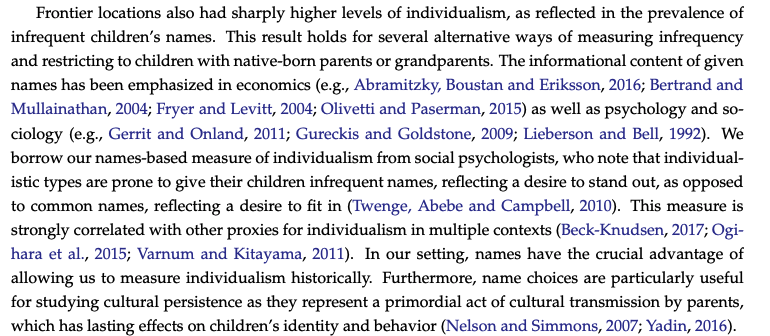This paper blew up on Twitter. There are economists and historians waging arguments left and right. My take on why historians find this paper so problematic, and what economists who are calling historians "bullies" or "poor at empirical methods" are missing: 1/n https://twitter.com/ecmaEditors/status/1305868975289532426">https://twitter.com/ecmaEdito...
It& #39;s true that for many historians, this type of econometric analysis is foreign. The attempt to quantify individuality and a frontier experience would seem bonkers to most historians. How do you quantify an experience? It& #39;s not something most historians would attempt. 2/n
The paper uses whether children are granted common or uncommon names as a variable to determine how individualistic frontier societies are. A historian would probably ask lots of questions. What about social factors, like reliance upon public goods? 3/n
More importantly is perhaps that most historians would challenge the premise of the question itself. What were the historical circumstances and context that led to Turner& #39;s thesis, and how was it used? This lack of critical distance is the more concerning aspect. 4/n
And that& #39;s where I think the real furor comes from. Frederick Jackson Turner& #39;s Frontier Thesis has been the subject of hundreds, if not thousands, of books and articles. The entire field of early US history and American Studies deals 5/n
with the idea of the American frontier, and its implications for American identity, American exceptionalism, and American empire. It& #39;s been used as justification for the genocide of indigenous peoples, for the expansion of US military across the world. 6/n
Yet, reading the literature review, none of this is present. In fact, "empirical examination" serves almost as a veil, as if it means one does not need to engage with deeply problematic history of the Frontier thesis and why it has been challenged in the past century. 7/n
This may be roughly akin to a historian using a microhistory of a single, marginalized 19th century economic thinker Henry George to ignore a century of neoclassical economic policies and claim that the single land tax is the answer to global income inequality. 8/n
I suppose this could be justified in an extremely narrow sense, which I can understand. But this paper doesn& #39;t just stop at the "empirical" border. It uses its quantification of "Total Frontier Experience" to see if there is a correlation 9/n
between the frontier experience and increased voting for the Republican party. I understand this is just a correlation. Again, though, I would point to every aspect of this research, from what is the frontier and individuality, whether structural issues have defined 10/n
frontier society, whether the frontier at the time of Turner carries into present American society, and say that there are hundreds of books on it by historians. I can accept there is a kind of niche field where this quantification is interesting to see. 11/n
But at what point do we say that its value is diminished by ignoring an entire field of social science scholarship that already answers these questions in far more detail than an econometric article can provide? /end

 Read on Twitter
Read on Twitter




